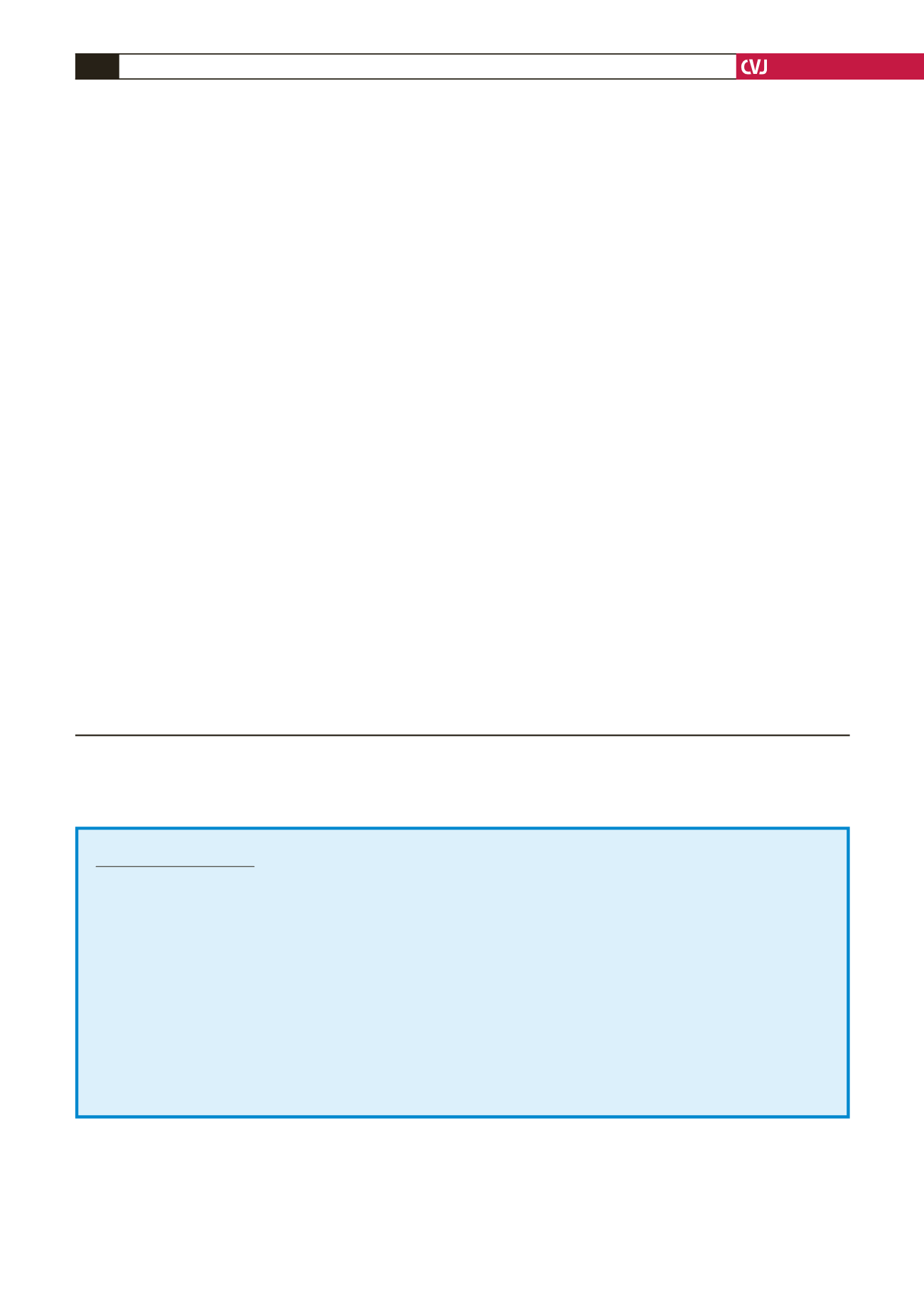

CARDIOVASCULAR JOURNAL OF AFRICA • Volume 30, No 6, November/December 2019
372
AFRICA
the only intervention proven to alter the natural history of RHD
and save lives. Improving access to this essential medicine must
be prioritised by governments and clinicians must be supported
to use it confidently and safely.
This research did not receive any specific grant from funding agencies in the
public, commercial, or not-for-profit sectors. We acknowledge the tremen-
dous effort of Ms Janette Lombard the PASCAR office administrator for
compiling the survey and analysing the data. The PASCAR Working Group
on BPG acknowledges the contribution of survey participants.
References
1.
Watkins DA, Johnson CO, Colquhoun SM, Karthikeyan G, Beaton A,
Bukhman G. Global, region and national burden of rheumatic heart
disease 1990–2015.
N Engl J Med
2017;
377
(8): 713–722.
2.
Kassem AS, Madkour AA, Massoud BZ, Zaher SR. Benzathine peni-
cillin G for rheumatic fever prophylaxis: 2 weekly versus 4 weekly regi-
mens.
Indian J Pediatr
1992;
6
: 741–748.
3.
World Health Organization. WHO Model List of Essential Medicines.
20th List, April 2017.
4.
Wyber R, Tauberty K, Markoz S, Kaplanx EL. Benzathine penicillin G
for the management of RHD: concerns about quality and access, and
opportunitiesfor intervention and improvement.
Global Heart
2013;
8
:
227–234.
5.
Watkins D, Zuhlke L, Engel M, Daniels R, Francis V, Shaboodien G,
et
al
. Seven key actions to eradicate rheumatic heart disease in Africa: the
Addis Ababa communiqué.
Cardiovasc J Afr
2016;
27
: 1–5.
6.
Taubert K, Marko SB. Access to essential medicines: illuminating
disparities in the global supply of benzathine penicillin g in the context
of rheumatic fever/rheumatic heart disease prevention.
J Am Coll
Cardiol
2013;
61
(Suppl 10): E2004.
7.
Nurse-Findlay S, Taylor MM, Savage M, Mello MB, Saliyou S, Lavayen
M,
et al
. Shortages of benzathine penicillin for prevention of mother-
to-child transmission of syphilis: An evaluation from multi-country
surveys and stakeholder interviews.
PLoS Med
2017;
14
(12): e1002473.
8.
Shetty V, Sabitha P, Adhikari PM, Kamath A. Approach to penicillin
allergy – a survey.
Iran J Pharma Therapeut
2008;
1
: 127–130
9.
RajRegmi P, Wyber R. Prevention of rheumatic fever and heart disease:
Nepalese experience.
Global Heart
2013;
8
: 247–252.
10. WHO rheumatic fever and rheumatic heart disease. Geneva, Switzerland:
WHO Technical Report Series 923, World Health Organization, 2001;
chapter 11: 95.
11. Bernstein IL, Li JT, Bernstein DI, Hamilton R, Spector SL, Tan R,
et al
.
Allergy diagnostic testing: an updated practice parameter.
Ann Allergy,
Asthma Immunol
2008;
100
: S1–S148.
12. Long A, Lungu JC, Machila E, Schwaninger S, Spector J, Tadmor B,
et al
. A programme to increase appropriate usage of benzathine penicil-
lin for management of streptococcal pharyngitis and rheumatic heart
disease in Zambia.
Cardiovasc J Afr
2017;
28
: 242–247.
13. Amir J, Ginat S, Cohen YH. Lidocaine as a diluent for administration
of benzathine penicillin G.
Pediatr Infect Dis J
1998;
17
(10): 890–893.
14. Markowitz M, Kaplan E, Cuttica R, Berrios X, Huang Z, Rao X,
et
al
. International Rheumatic Fever Study Group. Allergic reactions to
long-term benzathine penicillin prophylaxis for rheumatic fever
. Lancet
1991;
337
: 1308–1310.
… continued from page 368
Commenting on the research, Professor Paul Leeson,
professor of cardiovascular medicine, at the University of
Oxford, said in a report in
The Daily Telegraph:
‘This study
has the potential to transform how we prescribe blood
pressure medication. The findings are likely to be relevant to
most people who take tablets for high blood pressure.
Dr Richard Francis, head of research, Stroke Association
added: ‘We’re pleased to see this research, which could
potentially change the way we prevent strokes in the future.
This is a robust study that shows that people who take their
blood pressure medication at night have better blood pressure
control and have reduced risk of a cardiovascular event such
as a stroke or heart attack. ‘Hopefully we can see studies
like this recreated in the UK and combined with existing
evidence, this could lead to a review of current guidelines on
treating high blood pressure.’
Vanessa Smith, from the British Heart Foundation, said in
a BBC News report: ‘Although this study supports previous
findings in this area, further research among other ethnic
groups and people who work shift patterns would be needed,
to truly prove if taking blood pressure medication at night is
more beneficial for cardiovascular health. If you’re currently
taking blood pressure medication, it’s important to check
with your GP or pharmacist before changing the time you
take it. There may be specific reasons why your doctor has
prescribed medication in the morning or night.’
Source:
Medical Brief 2019



















